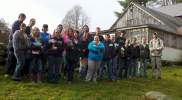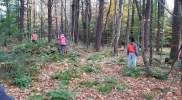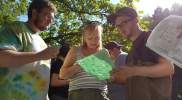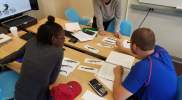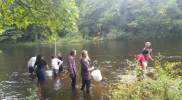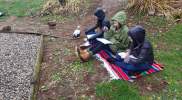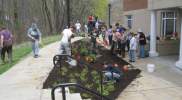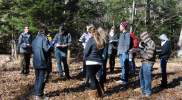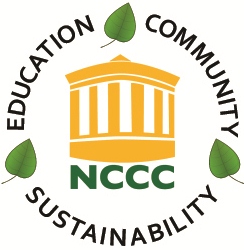Becoming Connecticut State Community College
STUDENTS: The Community Colleges are undergoing a merger with a plan to become Connecticut State Community College in fall 2023; please work closely with your advisor/program coordinator to select your courses accordingly. Click here for more details about this merger.
Welcome to NCCC’s exciting Natural Resources Associates Degree program!
Program Advisor: Tara Jo Holmberg (email only)
Book a time to discuss our program virtually!
There are few degrees that could be more useful in understanding the world around us. As we head into a future where resources become increasingly limited, having an understanding of how our world stays healthy is paramount. Through this, we may find solutions for a more sustainable future. Couple this with the fact that resources (and how they’re handled) ultimately control markets and geopolitical stability. Without an understanding of environmental science, we cannot influence which direction our world goes.
~Nic DiPerro, Alumni
I have actually spoken to a few people and suggested the Environmental Sciences/Natural Resources program at NCCC. I’ve let them all know that when I went on to pursue my Bachelor’s in Biology at CCSU I felt extremely prepared. In fact, I was even a little more prepared than the students who had been at CCSU since their freshman year. The Integrated Biology class (Bio III) was basically a refresher of the Bio I and II courses I studied at NCCC. I had no issues transitioning into the Bachelor’s courses, and even saved a little money starting off at NCCC 🙂
~Amy Charlton, Alumni, Army Corps of Engineers Ranger, Connecticut
Mission
This program is designed for students with an interest in environmental science, forestry, fisheries, conservation ecology, environmental biology, sustainability, wildlife management, soil science, environmental health and monitoring, sustainable agriculture/horticulture, and resource economics. A degree in natural resources provides students with a strong background in basic sciences, including life and the physical sciences, in addition to introducing them to concepts in nature conservancy, resource management, and environmental risk and assessment.
Times are changing, and they’re changing rapidly. There seems to be a large disconnect in people’s understanding that humans are not above the environment. The actions we take play an important role on the world around us. It is up to the new generation to have a positive impact, and lead the way in making a change. There is still so much knowledge that can be attained and so much good that can be done
~Pat Carr, Alumni, National Parks Wildlife Surveyor
Vision
The Natural Resources program at NCCC will continue to provide a quality science-based education for students looking to pursue careers studying and improving the interface between the built and natural environments. The programs will continue to grow and will be maintained to reflect the current scientific foci, theories, issues, and adaptation/mitigation strategies in the various professions and fields of study represented by this degree. The program will be overseen by a Program Coordinator who has the responsibility of outreach and recruitment for the program, in addition to advising and curriculum/program development.
NCCC will devote funding to the program such that the field and indoor labs can be run with the most up-to-date equipment and that software can be purchased. In addition, the Natural Resources program will be promoted and marketed as one that is rapidly growing and in demand throughout the various sectors of the local, regional, and nationwide economies.
What Can I Do With This Major?
I grew up hunting, fishing, and enjoying outdoor recreation as a whole with beloved friends and family. As someone who recognizes the value of our environment, from both recreational and ecological standpoints, I wish to dedicate my efforts to remediation and conservation to provide future generations with the same experiences and quality of life that I have enjoyed. By studying environmental science, I have been enabled to contribute to this cause.
~Nick Lockwood, Alumni, Internship with FRCC
Careers and Transfer
Students enrolled in the Natural Resources program at NCCC prepare for careers in sustainable agriculture/horticulture, forest and fisheries management, marine science, conservation enforcement, wetlands and watershed management, land use and planning, environmental biology, environmental research, as well as natural resources consulting, monitoring, remediation, and oversight. Students may choose to transfer into programs such as those offered through the College of Agricultural and Natural Resources at UCONN, the School of Arts and Sciences at Central Connecticut State University, the Department of Biological and Environmental Sciences as Western Connecticut State University, and many other college and university programs across the state, region, and country.
Students have transferred to many bachelor-degree institutions. Some alumni are also now pursuing MS and PhDs in related fields of study. Just some of their transfer colleges and universities are listed below:
Once I transferred to my graduate school I realized how immensely NCCC was a way ahead of the curve of learning. Many of the labs that I took at NCCC we’re the same style labs that I took at a 4-year university. Procedures and lab reports came fairly easily for me, and I was able to quickly begin an internship with the FRCC [Farmington River Coordinating Committee]. Which let me work directly in the field of my hometown.
~Ella McPherson, Alumni
When I feel discouraged, I think about all of the jobs that I would rather NOT be doing. I think about how awesome it is that I have my degree backing me so I can work at a job that I actually enjoy. I’ve worked so hard to get to where I am today, and I’m proud of what I do!
~Sarah Charlton, Alumni, White Flower Farm Botany Department


